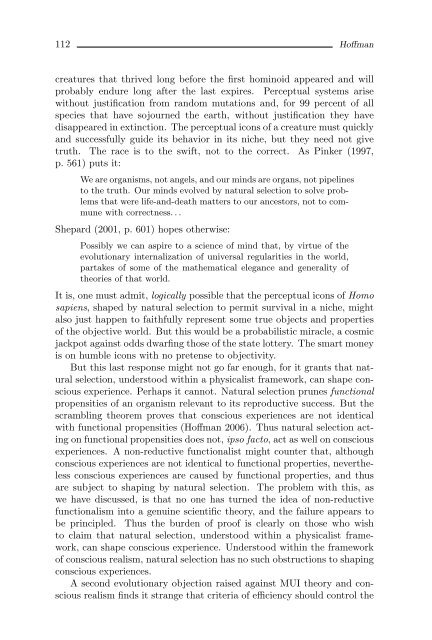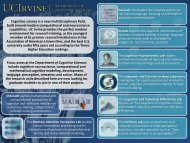112 Hoffmancreatures that thrived long before <strong>the</strong> first hominoid appeared <strong>and</strong> willprobably endure long after <strong>the</strong> last expires. Perceptual systems arisewithout justification from r<strong>and</strong>om mutations <strong>and</strong>, for 99 percent of allspecies that have sojourned <strong>the</strong> earth, without justification <strong>the</strong>y havedisappeared in extinction. The perceptual icons of a creature must quickly<strong>and</strong> successfully guide its behavior in its niche, but <strong>the</strong>y need not givetruth. The race is to <strong>the</strong> swift, not to <strong>the</strong> correct. As Pinker (1997,p. 561) puts it:We are organisms, not angels, <strong>and</strong> our minds are organs, not pipelinesto <strong>the</strong> truth. Our minds evolved by natural selection to solve problemsthat were life-<strong>and</strong>-death matters to our ancestors, not to communewith correctness. . .Shepard (2001, p. 601) hopes o<strong>the</strong>rwise:Possibly we can aspire to a science of mind that, by virtue of <strong>the</strong>evolutionary internalization of universal regularities in <strong>the</strong> world,partakes of some of <strong>the</strong> ma<strong>the</strong>matical elegance <strong>and</strong> generality of<strong>the</strong>ories of that world.It is, one must admit, logically possible that <strong>the</strong> perceptual icons of Homosapiens, shaped by natural selection to permit survival in a niche, mightalso just happen to faithfully represent some true objects <strong>and</strong> propertiesof <strong>the</strong> objective world. But this would be a probabilistic miracle, a cosmicjackpot against odds dwarfing those of <strong>the</strong> state lottery. The smart moneyis on humble icons with no pretense to objectivity.But this last response might not go far enough, for it grants that naturalselection, understood within a physicalist framework, can shape consciousexperience. Perhaps it cannot. Natural selection prunes functionalpropensities of an organism relevant to its reproductive success. But <strong>the</strong>scrambling <strong>the</strong>orem proves that conscious experiences are not identicalwith functional propensities (Hoffman 2006). Thus natural selection actingon functional propensities does not, ipso facto, act as well on consciousexperiences. A non-reductive functionalist might counter that, althoughconscious experiences are not identical to functional properties, never<strong>the</strong>lessconscious experiences are caused by functional properties, <strong>and</strong> thusare subject to shaping by natural selection. The problem with this, aswe have discussed, is that no one has turned <strong>the</strong> idea of non-reductivefunctionalism into a genuine scientific <strong>the</strong>ory, <strong>and</strong> <strong>the</strong> failure appears tobe principled. Thus <strong>the</strong> burden of proof is clearly on those who wishto claim that natural selection, understood within a physicalist framework,can shape conscious experience. Understood within <strong>the</strong> frameworkof conscious realism, natural selection has no such obstructions to shapingconscious experiences.A second evolutionary objection raised against MUI <strong>the</strong>ory <strong>and</strong> consciousrealism finds it strange that criteria of efficiency should control <strong>the</strong>
<strong>Conscious</strong> <strong>Realism</strong> <strong>and</strong> <strong>the</strong> <strong>Mind</strong>-<strong>Body</strong> <strong>Problem</strong> 113user interface. Efficiency with respect to what if, as MUI <strong>the</strong>ory claims,<strong>the</strong>re is no way to access <strong>the</strong> real world ? The logic here is a little bit likethat of Descartes. Where he suggested that <strong>the</strong> mental world is similar to<strong>the</strong> physical one, MUI <strong>the</strong>ory suggests that <strong>the</strong> mental world is built insuch a way to be a useful schema of <strong>the</strong> physical one. Useful with respectto what ? And why should we need a simplified version ?In answering this objection, we must again be careful how we use ourterms. In particular, as discussed before, <strong>the</strong> phrase real world could mean<strong>the</strong> real worlds of our sensory perceptions, whose existence is observerdependent.Or it could mean a world that is objective, in <strong>the</strong> sense thatit is observer-independent. It is <strong>the</strong> latter interpretation that is probablyintended by <strong>the</strong> objection. If so, <strong>the</strong>n MUI <strong>the</strong>ory does not claim <strong>the</strong>reis no access to <strong>the</strong> real world, but ra<strong>the</strong>r that our access is via sensorysystems that radically simplify, <strong>and</strong> probably in no way resemble, thatreal world. There is access, just no resemblance.Similarly, when this objection speaks of <strong>the</strong> physical world, it presumablyassumes a physicalist ontology, with physical objects <strong>and</strong> propertiesthat are observer-independent. If so, MUI <strong>the</strong>ory <strong>and</strong> conscious realismtoge<strong>the</strong>r do not claim that our sensory worlds are built to be a usefulschema of <strong>the</strong> physical world, for <strong>the</strong>y reject <strong>the</strong> ontology of physicalism.If <strong>the</strong>re is no observer-independent physical world, <strong>the</strong>n <strong>the</strong>re is noreason to build schemas of it. MUI <strong>the</strong>ory asserts, instead, that <strong>the</strong> physicalworld, <strong>the</strong> world of space-time, objects, matter <strong>and</strong> so on, is itself asensory user interface that is observer-dependent. This might be counterintuitiveto a physicalist, but it is not logically self-contradictory. It canbe made ma<strong>the</strong>matically precise, <strong>and</strong> is consistent with quantum <strong>the</strong>ory.With <strong>the</strong>se provisos, we can now address <strong>the</strong> main question of thisobjection, which is why criteria of efficiency <strong>and</strong> usefulness should control<strong>the</strong> user interface. The reason is that, according to conscious realism,<strong>the</strong>re is a reality independent of any particular observer, <strong>and</strong> to interactintelligently or appropriately with that reality one’s sensory perceptionsmust be a useful <strong>and</strong> efficient guide to that reality. <strong>Conscious</strong> realismis not solipsism. There is a reality independent of my perceptions, <strong>and</strong>my perceptions must be a useful guide to that reality. This reality consistsof dynamical systems of conscious agents, not dynamical systems ofunconscious matter. Moreover, this reality is quite complex. So if mysensory systems are to be efficient, <strong>the</strong>y must dramatically simplify thiscomplexity, <strong>and</strong> yet still provide a useful guide.A third objection to MUI <strong>the</strong>ory runs as follows: Inexplicably, <strong>the</strong>table I see is created by my personal user interface, but your table iscreated in a way that is coherent with my own. An ironic reader wouldask whe<strong>the</strong>r <strong>the</strong>y are using <strong>the</strong> same operating system.To answer this, it is important to note that MUI <strong>the</strong>ory does notrequire that your user interface be functionally identical to mine. Evo-







